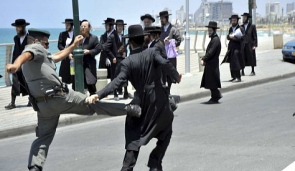
According to the Suddeutsche Zeitung, in 1970 several theologians wrote to the German Bishops asking that the requirement that all priests in the Latin Church to be celibate be discussed. Among the theologians were Karl Rahner, Walter Kasper, Karl Lehman – and Joseph Ratzinger, currently Pope Benedict XVI. This letter was quietly and discretely filed away and was recently leaked to a reform group in Regensburg.
They wrote that they did not desire to prejudice the decision of the Church, but that they thought that the long-standing tradition of clerical celibacy should be reconsidered in the light of modern historical and social conditions “neuen geschichtlichen und gesellschaftlichen Situationen,” such as the ever-increasing lack of priests, “dieses akuter werdenden Priestermangels.” They also pointed to the Eastern Catholic churches, which ordain married men.
In particular, they wondered whether such a requirement of celibacy was prudent in the overheated sexual atmosphere of the modern world. They questioned the formation of priests. If a candidate said he had no problem with celibacy, did he really know his own desires? They also thought it important to consider “the psychological instability of many young men in today’s sexually overwrought society,” “die psychische Labilität vieler junger Menschen in der heutigen sexuell überreizten Gesellschaft.”
The signers indicated that celibacy was closely connected to the priesthood, but that refusing to discuss the current discipline seemed to show more faith in the power of formal authority “an die Macht einer formalen Autorität” than in the power of the recommendation of celibacy in the Gospel “die Kraft der evangelischen Empfehlung des ehelosen Lebens um des Himmelreiches willen.”
Ratzinger has changed his mind over certain issues over the course of his lifetime – this is neither surprising nor dishonest. However, he should explain how he went from point A to point B, especially to those who are at point A.
Celibacy, like fidelity in marriage, is difficult for men. Male sexuality is unruly, and always ha been. However, the situation in the modern world may make celibacy almost impossible for men who are otherwise good candidates for the priesthood. The omnipresence of Internet pornography and the availability of contraception have perhaps permanent changed the sexual milieu which young men develop.
In his epistles Paul goes back and forth between recommending celibacy for the unmarried and widowed and thinking that, since the world is not going to end immediately, it would be better for people to marry and for the married to abstain from relations at most for a time, lest they be tempted.
The Eastern Churches have married clergy, and despite all Vatican protestations to the contrary the Eastern Churches are second-class members of the universal Catholic church. They are not allowed to ordain married men in countries where the Latin rite predominates. Their patriarchs rank behind cardinals and do not vote in papal elections. And there are many other such slights which indicate that the Eastern Churches are tolerated rather than treasured.
The pope should not change the disciple of celibacy on his own – he should consult with the bishops of the world. Even if Benedict thinks it might be a wise idea to sometimes ordain married men, he may hesitate for two reasons:
First, once the disciple of celibacy was abandoned, it would be almost impossible to reinstate it if it turned out that, for all its problems, celibacy indeed provided a spiritual dynamism to the clergy of the Latin Church.
Second, if the discipline of celibacy were abandoned, it would raise expectations of changes in other matters which are far more serious, such as the ordination of women.
So I suspect Benedict will do nothing and let the next pope handle the problem. The next pope will also do nothing, and so on. Perhaps the Third Vatican Council will take it up in 2300.




